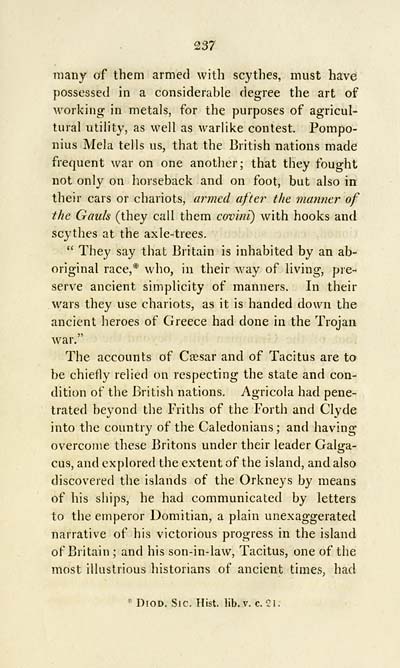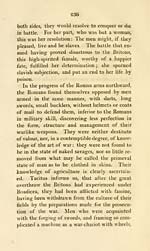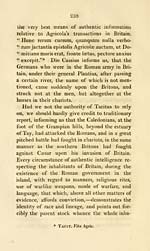Download files
Complete book:
Individual page:
Thumbnail gallery: Grid view | List view

many of them armed with scythes, must have
possessed in a considerable degree the art of
working in metals, for the purposes of agricul-
tural utility, as well as Avarlike contest. Pompo-
nius Mela tells us, that the British nations made
frequent war on one another; that they fought
not only on horseback and on foot, but also in
their cars or chariots, armed after the mamier of
the Gauls (they call them covini) with hooks and
scythes at the axle-trees.
" They say that Britain is inhabited by an ab-
original race,* who, in their way of living, pre-
serve ancient simplicity of manners. In their
wars they use chariots, as it is handed down the
ancient heroes of Greece had done in the Trojan
war."
The accounts of Cassar and of Tacitus are to
be chiefly relied on respecting the state and con-
dition of the British nations. Agricola had pene-
trated beyond the Friths of the Forth and Clyde
into the country of the Caledonians; and having
overcome these Britons under their leader Galga-
cus, and explored the extent of the island, and also
discovered the islands of the Orkneys by means
of his ships, he had communicated by letters
to the emperor Domitian, a plain unexaggerated
narrative of his victorious progress in the island
of Britain ; and his son-in-law, Tacitus, one of the
most illustrious historians of ancient times, had
* DioD, Sic, Hist, lib.v. c. Cl.
possessed in a considerable degree the art of
working in metals, for the purposes of agricul-
tural utility, as well as Avarlike contest. Pompo-
nius Mela tells us, that the British nations made
frequent war on one another; that they fought
not only on horseback and on foot, but also in
their cars or chariots, armed after the mamier of
the Gauls (they call them covini) with hooks and
scythes at the axle-trees.
" They say that Britain is inhabited by an ab-
original race,* who, in their way of living, pre-
serve ancient simplicity of manners. In their
wars they use chariots, as it is handed down the
ancient heroes of Greece had done in the Trojan
war."
The accounts of Cassar and of Tacitus are to
be chiefly relied on respecting the state and con-
dition of the British nations. Agricola had pene-
trated beyond the Friths of the Forth and Clyde
into the country of the Caledonians; and having
overcome these Britons under their leader Galga-
cus, and explored the extent of the island, and also
discovered the islands of the Orkneys by means
of his ships, he had communicated by letters
to the emperor Domitian, a plain unexaggerated
narrative of his victorious progress in the island
of Britain ; and his son-in-law, Tacitus, one of the
most illustrious historians of ancient times, had
* DioD, Sic, Hist, lib.v. c. Cl.
Set display mode to: Large image | Transcription
Images and transcriptions on this page, including medium image downloads, may be used under the Creative Commons Attribution 4.0 International Licence unless otherwise stated. ![]()
| Early Gaelic Book Collections > Ossian Collection > Thoughts on the origin and descent of the Gael > (249) |
|---|
| Permanent URL | https://digital.nls.uk/82237432 |
|---|
| Description | Selected books from the Ossian Collection of 327 volumes, originally assembled by J. Norman Methven of Perth. Different editions and translations of James MacPherson's epic poem 'Ossian', some with a map of the 'Kingdom of Connor'. Also secondary material relating to Ossianic poetry and the Ossian controversy. |
|---|
| Description | Selected items from five 'Special and Named Printed Collections'. Includes books in Gaelic and other Celtic languages, works about the Gaels, their languages, literature, culture and history. |
|---|

